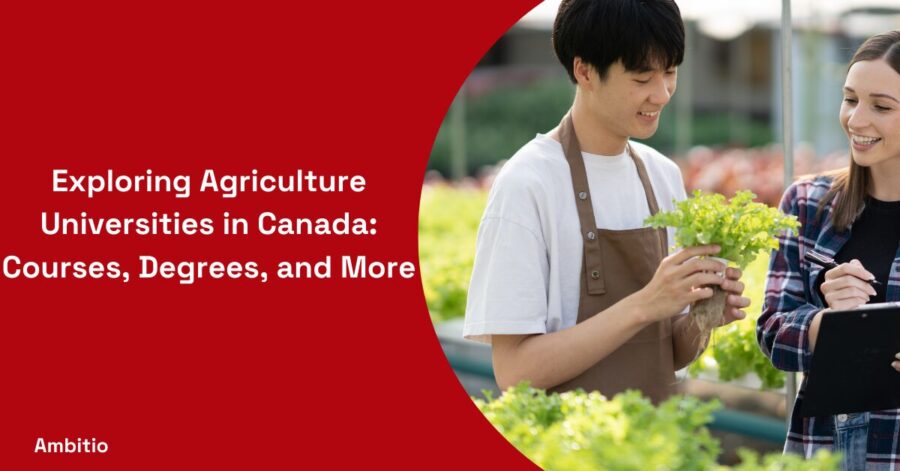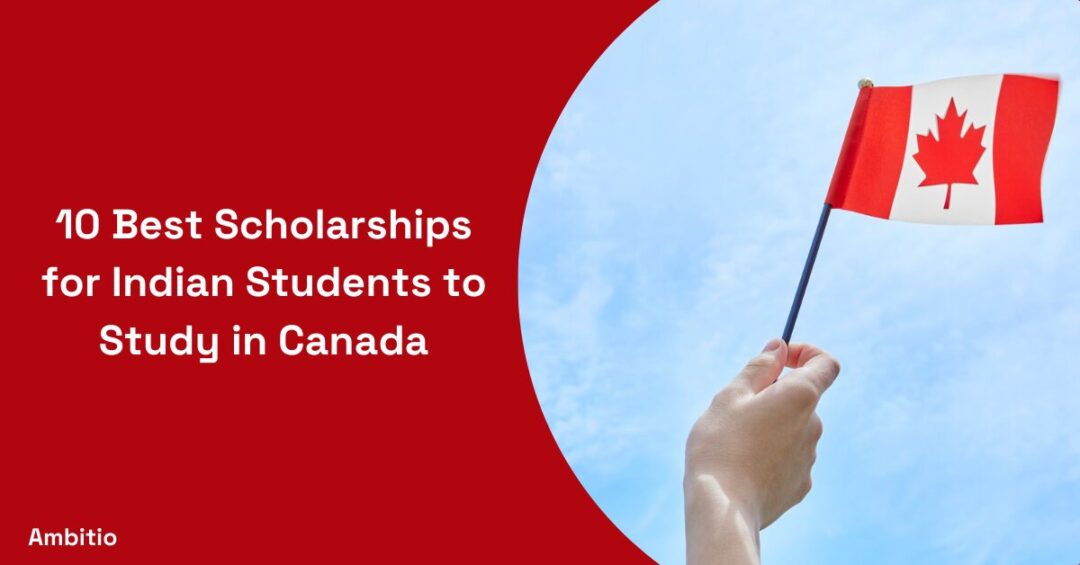13 December 2024
6 minutes read
Exploring Agriculture Universities in Canada: Courses, Degrees, and More

Introduction
Canada, with its rich agricultural heritage and modern innovations, offers a fertile ground for those seeking a degree in agriculture. In this comprehensive guide, we’ll delve into the world of agriculture universities in Canada, highlighting courses, degrees, and opportunities for international students.
Top Agriculture Universities in Canada
Canada is home to several prestigious agriculture universities that provide world-class education and research opportunities. Let’s explore some of the top institutions dedicated to agricultural studies:
University of Guelph: Nurturing Agricultural Excellence in Ontario
Located in the picturesque province of Ontario, the University of Guelph stands as a beacon for agriculture enthusiasts. With a rich history in agricultural education, this institution offers a wide range of programs and research opportunities in the field.
University of British Columbia: Championing Sustainable Agriculture in the West
Nestled in the vibrant province of British Columbia, the University of British Columbia (UBC) is a leader in sustainable agriculture research and education. Explore the programs and initiatives that make UBC a top choice for aspiring agriculturalists.
McGill University: Groundbreaking Agricultural Research in Quebec
McGill University, situated in the heart of Quebec, boasts a legacy of groundbreaking agricultural research. Learn about the innovative programs and studies conducted at this prestigious institution.
University of Saskatchewan: Exploring Agriculture in the Prairie Province
The University of Saskatchewan, located in the prairie province of Saskatchewan, plays a crucial role in advancing agricultural resource economics and studying the agricultural sector. Dive into the agricultural programs and research conducted here.
University of Alberta: Pioneering Agricultural Science and Agribusiness
In Alberta, the University of Alberta stands as a hub for agricultural science and agribusiness education. Explore the courses and opportunities available to students with a passion for agriculture.
Courses and Degrees in Canadian Agriculture Universities
Canadian agriculture universities offer a diverse range of courses and degree programs to cater to the interests and career goals of aspiring agriculturalists. Whether you’re interested in the fundamental principles of agricultural science, agribusiness management, or cutting-edge research in sustainable agriculture, there’s a program for you. Let’s explore the educational options available:
Undergraduate Programs: Cultivating the Basics of Agriculture
Undergraduate programs are the foundation of your agricultural education journey in Canada. These programs typically span three to four years and provide you with a comprehensive understanding of agricultural principles and practices. Some common undergraduate degrees include:
1. Bachelor of Science in Agriculture: This program covers a broad spectrum of agricultural topics, including crop and soil science, animal husbandry, and agricultural economics. It provides a well-rounded education in the field.
2. Bachelor of Agribusiness: Focusing on the business side of agriculture, this degree equips students with management, marketing, and financial skills tailored to the agricultural sector.
3. Bachelor of Environmental Science (Agriculture and Environmental Management): Combining agriculture with environmental science, this program explores sustainable practices and ecological aspects of farming.
4. Bachelor of Food Science: If you’re interested in the food industry and the science behind food production, this program covers topics like food safety, nutrition, and food processing.
Postgraduate Programs: Nurturing Expertise in Specialized Areas
For those seeking in-depth knowledge and specialization, postgraduate programs in Canadian agriculture universities are the way to go. These programs typically include:
1. Master’s in Agriculture (M.Ag.): This program allows students to delve deep into a specific area of agriculture, conduct research, and contribute to the field’s advancement. Specializations may include agricultural economics, plant science, or animal science.
2. Ph.D. in Agricultural Science: Doctoral programs provide the opportunity to conduct groundbreaking research in agriculture. Students work closely with faculty members to explore complex agricultural issues and contribute to the field’s knowledge base.
Diplomas and Certificates: Short-Term Specializations
In addition to degree programs, Canadian agriculture universities often offer diplomas and certificates designed to provide specialized knowledge and skills. These short-term programs are ideal for students looking to enhance their expertise in specific areas of agriculture, including:
1. Diploma in Agricultural Management: This program focuses on the practical aspects of managing agricultural enterprises, including farm operations and financial management.
2. Certificate in Sustainable Agriculture: Sustainability is a critical aspect of modern agriculture. This certificate program teaches students how to implement environmentally friendly and socially responsible practices in farming.
3. Diploma in Agri-Food Management: Geared towards students interested in the food industry, this program covers food production, processing, and marketing.
4. Certificate in Precision Agriculture: In an era of technological advancement, precision agriculture is becoming increasingly important. This certificate program explores the use of technology and data in optimizing agricultural practices.
5. Diploma in Agricultural Equipment Technician: For those interested in the mechanics of farming, this program provides hands-on training in servicing and repairing agricultural equipment.
Studying Agriculture in Canada as an International Student
Canada’s reputation as a welcoming destination for international students extends to those interested in pursuing agricultural studies. Discover why Canada is an excellent choice for international students pursuing agriculture degrees:
Flexible Study Environments: Tailored for International Scholars
Explore how Canadian universities create flexible study environments that accommodate the unique needs of international students.
Scholarships and Financial Aid: Easing the Financial Burden
Learn about the various scholarships and financial aid options available to international students pursuing agriculture degrees in Canada.
English Proficiency Requirements: Ensuring Academic Success
Understand the English proficiency requirements and language support services provided to international students to ensure their academic success.
Tuition Fees and Cost of Living in Canada
One of the critical factors to consider when planning to study agriculture in Canada is tuition fees. Tuition fees can vary significantly depending on the university or college, the specific program, and your residency status. Here’s a closer look at understanding the costs:
Domestic vs. International Tuition
- Canadian universities typically have separate tuition fee structures for domestic and international students. Domestic students, those with Canadian citizenship or permanent residency, usually pay lower tuition fees compared to international students.
2. Varied Program Costs:
- Tuition fees can vary based on the type of program you choose. Undergraduate programs often have different fee structures than postgraduate (master’s and Ph.D.) programs. Additionally, specialized programs may have unique pricing.
3. Institution-Specific Rates:
- Each university and college in Canada sets its tuition fees. Prestigious institutions may have higher fees, while others may offer more affordable options.
4. Scholarships and Financial Aid:
- Many Canadian universities offer scholarships, grants, and financial aid to both domestic and international students. These can significantly reduce the financial burden of tuition fees. It’s essential to research and apply for these opportunities.
5. Payment Options:
- Canadian universities typically offer payment plans to help students manage their tuition fees. This can include semester-based payments or monthly installments.
Cost of Living: Budgeting for Student Life
In addition to tuition fees, you’ll need to budget for your cost of living while studying in Canada. The cost of living can vary depending on the city or province you choose for your studies. Here’s a breakdown of the key cost-of-living factors:
1. Accommodation:
- Renting an apartment or staying in university housing is a significant part of your living expenses. Costs vary widely between cities. Major metropolitan areas like Toronto and Vancouver tend to have higher rent prices, while smaller cities may offer more affordable options.
2. Food and Groceries:
- Canada offers a wide range of dining options, from inexpensive local eateries to fine dining restaurants. Cooking at home can be a cost-effective choice, and grocery costs can vary based on where you shop and your dietary preferences.
3. Transportation:
- Depending on your location, you may require public transportation or a vehicle. Public transit passes, fuel, insurance, and maintenance costs can contribute to your expenses.
4. Health Insurance:
- Health insurance is essential while studying in Canada. International students often need to purchase a mandatory health insurance plan offered by their institution or province. It’s crucial to understand the coverage and costs associated with health insurance.
5. Books and Supplies:
- Budget for textbooks, course materials, and any specialized equipment or supplies required for your agricultural studies.
6. Entertainment and Miscellaneous Expenses:
- Don’t forget to allocate funds for entertainment, personal expenses, and unexpected costs. Canada offers a vibrant cultural scene and numerous opportunities for leisure activities.
7. Currency Exchange and Banking Fees:
- If you’re an international student, consider exchange rates and potential banking fees when managing your finances.
8. Part-Time Work:
- Some international students opt for part-time work to supplement their income. Ensure you understand the regulations related to working while studying in Canada.
Conclusion: Cultivating Your Future in Canadian Agriculture
In conclusion, studying agriculture in Canada offers a unique opportunity to explore diverse fields within the agricultural sector. Whether you’re passionate about agricultural science, agribusiness, or sustainable agriculture, Canadian universities have something to offer. The rich academic environment, scholarships, and welcoming atmosphere make Canada an ideal destination for international students pursuing agriculture degrees.
This comprehensive guide has provided you with insights into the top agriculture universities, courses, opportunities for international students, financial considerations, and more. We hope this information helps you in your journey to cultivate a successful career in agriculture in the beautiful and diverse landscape of Canada.
FAQs
What are the top agriculture universities in Canada?
Some top institutions include the University of Guelph, the University of British Columbia, and McGill University.
Are there courses for international students in Canadian agriculture universities?
Yes, most universities offer programs designed to accommodate international students.
What agriculture degrees can I pursue in Canada?
You can pursue undergraduate and postgraduate degrees in various fields like agricultural science, sustainable agriculture, and more.
Do Canadian universities offer scholarships for agriculture students?
Yes, many universities provide scholarships and financial aid opportunities for both domestic and international students.
Is English proficiency required for admission?
Yes, most universities require proof of English proficiency, such as IELTS or TOEFL scores.

You can study at top universities worldwide!
Get expert tips and tricks to get into top universities with a free expert session.
Book Your Free 30-Minute Session Now! Book a call now




























